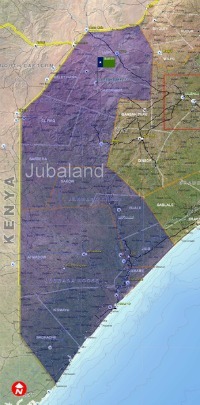Facebook Twitter (X) Instagram Somali Magazine - People's Magazine
Balancing Kenya’s Regional Influence, Security Concerns, and Diplomatic Alliances in East Africa
Kenya’s regional diplomatic strategy faces a significant challenge: Jubaland. The semi-autonomous region in Somalia has long been a source of political instability and security concerns, directly impacting Kenya’s border security and diplomatic standing in East Africa. Resolving this issue is crucial for stabilizing Somalia and reasserting Kenya’s regional influence, particularly following recent setbacks such as Raila Odinga’s unsuccessful bid for the African Union Commission (AUC) chairmanship.
Jubaland holds deep historical and political ties to Kenya and remains a crucial factor in Nairobi’s geopolitical calculations. For over 14 years, Ahmed Madobe, Jubaland’s leader, has enjoyed a close relationship with Kenyan administrations, using his position to counterbalance the influence of Somalia’s federal government. However, this long-standing alliance has now become a diplomatic liability, straining Kenya’s relations with Somalia and complicating its broader regional strategy.
Tensions between Kenya and Somalia are not new. Under former Somali President Mohamed Abdullahi Farmajo, disputes over territorial boundaries, economic interests, and security issues—including a maritime boundary disagreement in the Indian Ocean—led to a deterioration in relations. However, the election of President Hassan Sheikh Mohamud marked a turning point. Unlike his predecessor, Mohamud cultivated a strong relationship with Kenyan President William Ruto, fostering diplomatic cooperation between the two nations.
This renewed partnership was strategically important, stabilizing bilateral ties and offering Kenya greater leverage in Somali politics. Moreover, Mohamud reportedly supported Raila Odinga’s bid for the AUC chairmanship, underscoring a shared interest in regional stability. However, relations began to sour in November 2024 when Ahmed Madobe defied the Somali federal government’s wishes by proceeding with elections. This decision placed Kenya in a precarious diplomatic position.
Ahmed Madobe, who has governed Jubaland since 2012, remains a divisive figure in Somali politics. He has frequently clashed with various Somali presidents and has often been seen as a destabilizing force. His decision to hold elections despite opposition from Mogadishu and key political factions escalated tensions, forcing Kenya to reassess its support for him. While Kenya has historically backed Madobe as a bulwark against Al-Shabaab, this support has come at a cost, straining diplomatic ties with Somalia’s central government.
Madobe’s leadership has also faced growing criticism due to his failure to fully integrate the Ogaden clan into Somalia’s federal structure and his inability to expel Al-Shabaab from key territories. This has led to increasing dissatisfaction within Jubaland, further weakening his legitimacy as a regional leader. His continued defiance of the Somali government has put Kenya in a difficult position, caught between maintaining its influence in Jubaland and preserving its diplomatic ties with Mogadishu.
Kenya’s role as a regional power broker depends on its ability to navigate these complex political dynamics. The Jubaland issue is more than a regional dispute—it is a test of Kenya’s diplomatic agility and strategic vision. The crisis presents President Ruto with an opportunity to redefine Kenya’s leadership in the region by fostering stability and reinforcing diplomatic alliances.
Kenya must now make a decisive choice regarding its relationship with Jubaland. A recalibration of strategy could see Kenya reducing its direct support for Madobe while engaging more constructively with the Somali federal government. This shift could help repair strained relations with Mogadishu while maintaining Kenya’s influence in Jubaland through diplomatic channels. Strengthening intelligence-sharing mechanisms and enhancing border security cooperation with Somalia could also mitigate the threats posed by Al-Shabaab.
At the same time, Kenya must carefully manage its broader regional alliances. Strengthening ties with Ethiopia and Uganda could provide a buffer against the volatility in Somalia while ensuring Nairobi retains a dominant voice in East African geopolitics. The African Union and the Intergovernmental Authority on Development (IGAD) also present platforms through which Kenya can mediate the Jubaland issue without directly alienating any of the involved parties.
Ultimately, resolving the Jubaland dilemma will require a multi-pronged approach that balances diplomatic engagement, security concerns, and regional cooperation. If handled effectively, Kenya could not only stabilize its relationship with Somalia but also reinforce its role as a key power player in East Africa. President Ruto’s administration has a rare opportunity to turn a complex challenge into a diplomatic success story—one that could shape the country’s influence in the region for years to come.

